|
|
|
Sort Order |
|
|
|
Items / Page
|
|
|
|
|
|
|
| Srl | Item |
| 1 |
ID:
056720
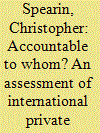

|
|
|
| 2 |
ID:
188312


|
|
|
|
|
| Summary/Abstract |
On the 20 March 2003, George W. Bush launched Operation ‘Iraqi Freedom’. At the time, it was unlikely anyone in his administration envisaged that United States (US) troops would eventually rely on the largest force of private military contractors in recent times. Victory over Saddam Hussein and the ensuing occupation and reconstruction of Iraq would have not happened without the support of military contractors working behind the scenes to ensure that combat troops receive adequate supplies, maintain vehicles and equipment, and protect military bases and convoys. In Afghanistan, the US and the other countries participating in the North Atlantic Treaty Organization (NATO) International Security Assistance Force mission relied on contractors providing logistics and armed security to an even larger extent. The NATO-trained Afghan military itself inherited US dependence on contractors, whose departure from Afghanistan alongside American soldiers was identified as one of the factors underlying Kabul armed forces’ inability to confront the Taliban’s advance.
|
|
|
|
|
|
|
|
|
|
|
|
|
|
|
|
| 3 |
ID:
100945


|
|
|
|
|
| Publication |
2010.
|
| Summary/Abstract |
The American call for commercial shippers to rely upon private security companies (PSCs) to protect their vessels from Somali pirates presents several challenges to sea users. Though this call for responsibilization inherently reveals state limitations, not all commercial shippers embrace it because it upsets traditional conceptions regarding order at sea. Also, the call's American origins suggest that the United States Navy may not work to ensure freedom of navigation in the last resort despite longstanding practice and the expectations of sea users. This, in turn, underscores the lack of structure in relations amongst states, shippers, and PSCs, which could have detrimental consequences regarding the management of violence at sea. The United States Navy may cease working to ensure freedom of navigation in the last resort despite longstanding practice and the expectations. While greater utilization of PSCs might seem to be an effective alternative and European states might add substance to the American call, perhaps through the Montreux Document, European activism is likely to be tempered by the different approaches towards private security that vary from country to country. PSC activism may affect the ability of navies to perform roles beyond the protection of commercial shipping.
|
|
|
|
|
|
|
|
|
|
|
|
|
|
|
|
| 4 |
ID:
132051


|
|
|
|
|
| Publication |
2014.
|
| Summary/Abstract |
With governments increasingly contracting private military and security companies (PMSCs) to perform military and police-related tasks, international relations scholars have made attempts to better understand PMSCs and to investigate the reasons for the boom of private security. Rather than focusing on the services these companies offer, which has been a common approach, we offer an identity-based explanation for their surge. We show that PMSCs eclectically assume identities related to the military, business managers and humanitarians, independent of the services they perform, their market segment or their location on the battlefield. This finding points to an important yet little-noted dimension in the private security industry. Although companies are heterogeneous, they also appear increasingly homogeneous because they incorporate a similar set of identities. On the one hand, this enables PMSCs to adapt to any context, client or employee, and, on the other hand, it has constitutive qualities, contributing to an important source of power for the respective companies. These multiple identities contribute to a norm of what a superior security provider should look like.
|
|
|
|
|
|
|
|
|
|
|
|
|
|
|
|
| 5 |
ID:
094610
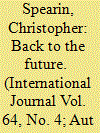

|
|
|
| 6 |
ID:
160622
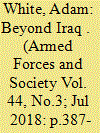

|
|
|
|
|
| Summary/Abstract |
Through the lens of veterans studies, we know a great deal about the fate of those soldiers who have recently returned home following a period of deployment in Iraq and Afghanistan, yet counterintuitively we know nothing about the plight of the private military contractors who worked alongside them. Addressing this blind spot, the article explores the socioeconomic trajectories of “private military veterans” from a life-course perspective. Specifically, it addresses three questions regarding their status in the civilian labor market. What occupations do they work in? To what extent do they work in similar occupations to public military veterans? To what extent do they work in similar occupations to the general population? Focusing on the U.K. case, it reveals that private military veterans are significantly overrepresented in the “protective service occupations,” where they primarily work in the private security industry, and offers a multilayered explanation for this distinctive clustering effect.
|
|
|
|
|
|
|
|
|
|
|
|
|
|
|
|
| 7 |
ID:
090762
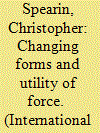

|
|
|
|
|
| Publication |
2009.
|
| Summary/Abstract |
This article's goal is to cast a net wider to consider how the private security industry may affect with Canadian forces position as Canada's official organisation charged with the responsibility to employ violence when needed overseas. The article's objective is to examine how Canada presently relies upon private security companies and why this reliance has come about.
|
|
|
|
|
|
|
|
|
|
|
|
|
|
|
|
| 8 |
ID:
080874
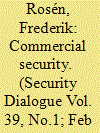

|
|
|
|
|
| Publication |
2008.
|
| Summary/Abstract |
Today, in what has been described as a re-emergence of privately organized extraterritorial force, the private military and security industry supplies the major military powers with a range of core services. This article asks how such a development came about, and why it has become politically uncomplicated to outsource such intimate state functions as the executive branches of foreign policy programmes. How did certain states arrive at a situation where it is unclear whether core military and security affairs are run by public or private agencies? The article answers these questions by presenting and commenting on general explanations as to why the private military industry has grown so much in post-invasion Iraq. It adds new perspectives to existing scholarly work by suggesting that the reappearance of private extraterritorial force could not have occurred on such a scale without a restructuring of neutrality in international relations. It is suggested that this change in neutrality might constitute the sine qua non of the re-emergence of private extraterritorial force.
|
|
|
|
|
|
|
|
|
|
|
|
|
|
|
|
| 9 |
ID:
082136
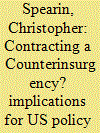

|
|
|
|
|
| Publication |
2007.
|
| Summary/Abstract |
Washington's growing reliance upon international private security companies (PSCs) will lead to these firms becoming prominent vehicles in the prosecution of the counterinsurgency in Iraq. This shift, however, risks labeling PSCs as mercenaries and presents considerable challenges regarding the control of non-state violence. Moreover, tradeoffs exist regarding the different nationalities of PSC personnel. Utilization of personnel from the developed world risks compromising the capabilities of Special Operations Forces. Additionally, shifts in casualty recognition amongst US policymakers and the media suggest that the private option is becoming politically salient and thus less useful. Many developing world states are increasingly concerned about how the global outsourcing of security sector expertise risks their stability and ability to execute coherent policy. Finally, the employment of Iraqis in PSCs sends mixed messages to the Iraqi populace about the need for and the effectiveness of a cohesive and responsible indigenous security sector.
|
|
|
|
|
|
|
|
|
|
|
|
|
|
|
|
| 10 |
ID:
170284
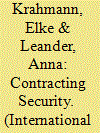

|
|
|
|
|
| Summary/Abstract |
Private military and security companies (PMSCs) are increasingly contracted to provide security in international peacekeeping missions. Yet, we know very little about the practical implications of this development. How do PMSCs reinforce and shape security management within UN peacekeeping operations, and what are the consequences for UN missions and their host populations? To answer these questions, we explore the operational, representative and regulatory security practices in the UN operation in the Democratic Republic of Congo (MONUSCO). Our findings show how seemingly uncontroversial, even benign security practices can have unintended negative consequences. Specifically, we observe that the participation of security firms in MONUSCO's security management contributes to three developments: the differentiation of security between staff and locals, the hardening of MONUSCO's security posture, and the perpetuation of insecurity through the emergence of a local security economy. Contracted security is thus involved in reproducing forms of security that are in some ways diametrically opposed to the aims of the mission to protect civilians and facilitate a sustainable peace.
|
|
|
|
|
|
|
|
|
|
|
|
|
|
|
|
| 11 |
ID:
144274


|
|
|
|
|
| Summary/Abstract |
Employing secondary research and semi-structured interviews, this article examines the use of private maritime security companies (PMSC) in providing maritime security services in the Horn of Africa. It consists of four parts. The first part explains the origins and development of the use of PMSC in the Horn of Africa. The second section discusses the regulation of the private security industry, paying particular attention to the maritime context. Part three examines the challenges associated with the use of maritime PMSC in the Horn of Africa, including negative human rights implications, compromising the innocent passage of commercial ships, and creating confusion in the hierarchical control of ships. Finally, the paper analyses the findings and concludes that PMSC, despite their apparent short-term effectiveness, cannot be regarded as a long-term solution to the piracy phenomenon in the Horn of Africa.
|
|
|
|
|
|
|
|
|
|
|
|
|
|
|
|
| 12 |
ID:
155817
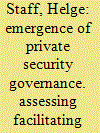

|
|
|
|
|
| Summary/Abstract |
Facing the threat of Somali piracy, private actors have created a private security governance framework by both issuing and implementing standards as well as offering operative security solutions through armed guards. Which conditions have facilitated this provision of private security? The present article approaches this research question in two innovative ways: Theoretically, by deriving four conditions from the literature on private climate governance and applying them to the security realm; and empirically, by analyzing the activities of Private Military and Security Companies and the shipping industry in the case of Somali piracy based on a series of semi-structured interviews. Thus, the article contributes to the literature on private security in at least two ways: it provides an extensive understanding of private security incorporating operative and regulative elements and it uses insights about private governance from a more developed field in order to understand private security governance more systematically. The article concludes that all four conditions prominent in the literature on climate change – risk perception, involvement of capital markets, governmental inability, and commodification – can successfully be applied to the case of Somali piracy and explain the emergence and dynamic of private security governance.
|
|
|
|
|
|
|
|
|
|
|
|
|
|
|
|
| 13 |
ID:
147821
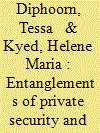

|
|
|
|
|
| Summary/Abstract |
Security in Africa is seldom a public good provided by the state, but is frequently something you pay for or acquire by turning to various non-state or community actors. The privatization of security in African cities is reflected in the rapid growth of the private security industry, which is matched by the widespread involvement of civilian actors in neighbourhood watches and self-organized policing groups. Much of the scholarly debate on ‘plural policing’ and ‘security assemblages’ has focused on what the privatization of security means for the state, highlighting how the public–private divide is increasingly blurred as state police services interact with either private or community security actors. This article adds a novel perspective by exploring the entanglements between private security companies and civilian community policing groups in urban areas of South Africa and Swaziland. Based on ethnographic fieldwork, the article shows how these actors engage with each other in different, often informal, ways and across socio-spatial boundaries. The result is the simultaneous communalization of private security and privatization of community policing. However, these are not straightforward processes. Sets of actors slip in and out of commercial and community logics of security, but also frequently articulate their distinctions as part of positioning themselves in a competitive security landscape, thereby raising questions about the objectives and motivations that drive many security performances.
|
|
|
|
|
|
|
|
|
|
|
|
|
|
|
|
| 14 |
ID:
067022
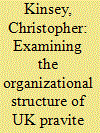

|
|
|
| 15 |
ID:
165256


|
|
|
|
|
| Summary/Abstract |
Social scientists and international relations scholars are increasingly analyzing data collected from Twitter or Facebook to examine political processes in which social media are used. The sheer amount of web 2.0 data and its heterogeneity (including text, photos, and videos), however, pose challenges which analysts frequently seek to overcome through a mixed method approach relying on both quantitative and qualitative methods. This article discusses the advantages and limits of using mixed methods for analyzing social media. We show how the shortcomings of quantitative methods such as sentiment analysis and data mining can be remediated by qualitative content methods in a study of the Twitter activity of private military and security companies (PMSCs).
|
|
|
|
|
|
|
|
|
|
|
|
|
|
|
|
| 16 |
ID:
100962
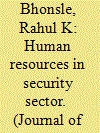

|
|
|
|
|
| Publication |
2010.
|
| Summary/Abstract |
The challenge of management of human resources may be the most profound in the security sector in the years ahead given transformations happening globally and enhancement of human potential and opportunities for individual growth. The national security sector extending from the military to private security guards denotes the plethora of skills sets required which vary from that of handling highly sophisticated and lethal missile arsenal, to commandeering large aircraft carriers and submarines to securing public space in metropolitan cities. Selection, training, motivation and incentivizing the force will be a major challenge for the 21st Century. The need of the hour is, therefore, to have an integrated human resource development policy so that lateral skills can be utilized across the three spectrums of defence, paramilitary and police and private security and enhance talent utilization through motivation. It argues that this will lead to effective and economic utilization of manpower with national ownership rather than as a stove piped resource, corresponding savings to the ex-chequer while adding to proficiency of security forces.
|
|
|
|
|
|
|
|
|
|
|
|
|
|
|
|
| 17 |
ID:
107935
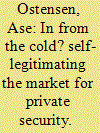

|
|
|
|
|
| Publication |
2011.
|
| Summary/Abstract |
Private military and security companies have gained political authority within the governance of security, but the increasing authority seems unmatched by legitimacy. This article analyzes self-legitimation efforts by the dominant Western industry. It draws on two different theoretical perspectives of legitimacy, organizational legitimacy and democratic legitimacy, and argues that four dimensions of legitimacy are relevant to these companies. The article finds empirically that there are different degrees of deficits in each dimension and discusses the use of some corresponding legitimating strategies used by the industry. Findings indicate that much effort currently seems concentrated on building input legitimacy, while there are also less concerted efforts to cultivate both output and moral legitimacy. The article warns that, if unchallenged, legitimation campaigns may lead to further accumulation of private influence on military and security policies, both nationally and internationally.
|
|
|
|
|
|
|
|
|
|
|
|
|
|
|
|
| 18 |
ID:
119282
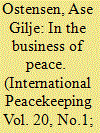

|
|
|
|
|
| Publication |
2013.
|
| Summary/Abstract |
Private military and security companies increasingly perform services for the UN. The article describes how these companies are used by the UN organization and become part of UN operations. Their participation influences the planning and implementation of UN peacekeeping. By performing tasks such as protective security, security training, peacekeeper training, counselling and intelligence, private companies influence both the epistemological and operational dynamics of peacekeeping. This not only diffuses authority over peacekeeping into the commercial market, it often happens with a very low degree of transparency.
|
|
|
|
|
|
|
|
|
|
|
|
|
|
|
|
| 19 |
ID:
083088
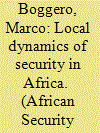

|
|
|
| 20 |
ID:
086097
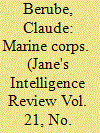

|
|
|
|
|
|
|
|